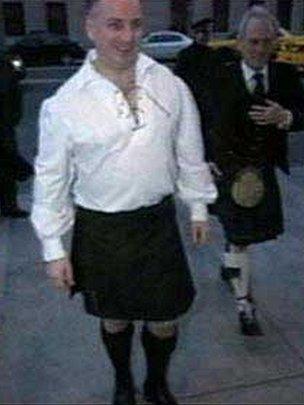Dalai ding-dong at first minister's questions
- Published

Alex Salmond's choice of tartan trews on his US trade visit was raised
It started with a hiss. And indeed a boo.
Johann Lamont seemed to feel that there should be such collective murmurs of discontent heading in the direction of Alex Salmond for his outfit, Stateside. Those tartan trews, you know.
Ms Lamont had the grace to acknowledge that the FM faced a degree of competition from his predecessor, Jack McConnell. (You must remember THAT kilt.) The Labour leader also noted, wryly, that she was speaking from her own lofty position as a demonstrable fashion icon.
In response, Nicola Sturgeon - deputising for her absent friend - suggested that, in this contest, Lord McConnell would remain the undoubted boss of silly outfits.
From silly outfits to silly walks - or, more widely, to the movies of Monty Python. For reasons of personal nomenclature, I have always felt an instinctive antipathy to the Python masterpiece, Life of B . . .
According to the Labour leader, the SNP resembled the sect in the Python film who queried the worth of Rome - only to indulge in a lengthy series of concessions as to the actual merits of Roman rule.
She lampooned the Nationalists for now seeking to retain the pound, the monarchy, the influence of the Bank of England and more.
It was a well-delivered attack, all founded on the Life of B . . . (Even now, I decline to use the name.)
Ms Lamont seemed to feel there was another word which was facing neglect: that of independence.
It has been suggested that SNP leaders have been advised by a guru to say "an independent Scotland" instead. "Independence", apparently, is just too final and brutal.
'Airy assertions'
In response, Ms Sturgeon decided to boldly go where psychologists fear to tread. She said "independence" repeatedly.
Indeed, she probably broke the world record for "Most Uses of the word Independence in a Single Answer." She owned "independence".
Independence, she said, would enable Scotland to avoid illegal wars, to scrap Trident and to protect the vulnerable from "Tory welfare reforms".
The exchanges were droll and gutsy, alternating between dry wit and passionate rhetoric. Both gave and got. But, alongside the verbal wrestling, it was easily possible to discern two competing themes which will underpin the forthcoming referendum.
The Labour attack?
That the SNP project is based upon "airy and meaningless assertions" - such as the proposal for Scotland to be given a place on the Bank's Monetary Policy Committee post independence.
That it is not worth the risk at a time of financial uncertainty.
Incidentally, in listing those British icons, Ms Lamont mentioned "the pound, the Bank of England, financial regulation, the Union Jack".

Elsewhere in fashion, Jack McConnell's choice of kilt, also during a visit to the US was raised in the chamber
That latter intrigued me in particular.
Apparently, the cross-party pro-Union campaign - which will launch on Monday - has discerned from polling that the flag of the UK is more popular among substantial segments of the population in Scotland than, frankly, they expected privately. (And, no, not just among its customary brandishers.)
The SNP attack? That the Unionist position amounts to a denial of Scottish self-determination.
That it means that Johann Lamont would rather see Scotland ruled by "her new friends" in the Tory Party. That the Labour leader, in effect, prefers "Tory government to self-government."
Ms Sturgeon made this point at every opportunity. Indeed, it seemed for a moment that her usage of the word "Tory" would outpace her courageous personal record, set with that risky word "independence."
The exchanges with the SNP's Conservative and Liberal Democrat opponents were more constrained. Ruth Davidson wanted Nicola Sturgeon to condemn industrial action by doctors.
Ms Sturgeon - who is health secretary - obliged but only in part. She regretted the action which, she stressed, fell short of a strike.
But she offered a second opinion: that the pension constraints ordered by the UK government were partly a "cash grab" to reduce immediate deficits rather than solely a structured device to make pension provision in the NHS more affordable in the longer term.
The deputy FM was, if anything, more cautious still in responding to Willie Rennie who suggested, in terms, that there had been Chinese pressure placed upon the Scottish Government and local authorities to downplay the visit to Scotland of the Dalai Lama.
Challenged explicitly by Mr Rennie, Ms Sturgeon said she condemned human rights abuses wherever they occurred.
She described the visit by the exiled Tibetan spiritual leader as being "pastoral" and counselled against seeking to cause political division as a consequence.